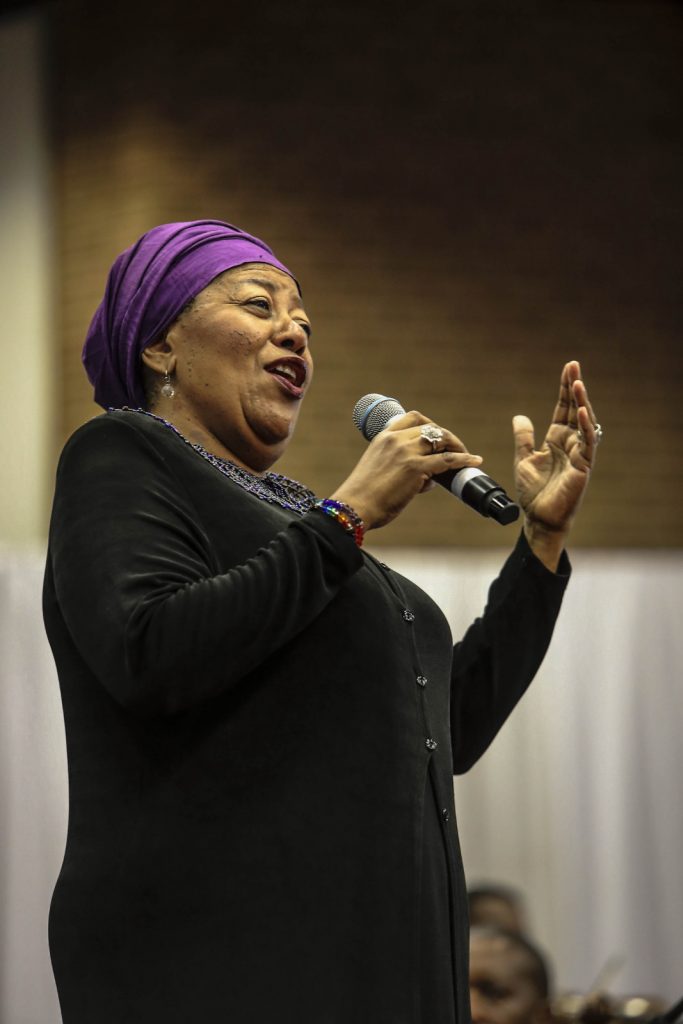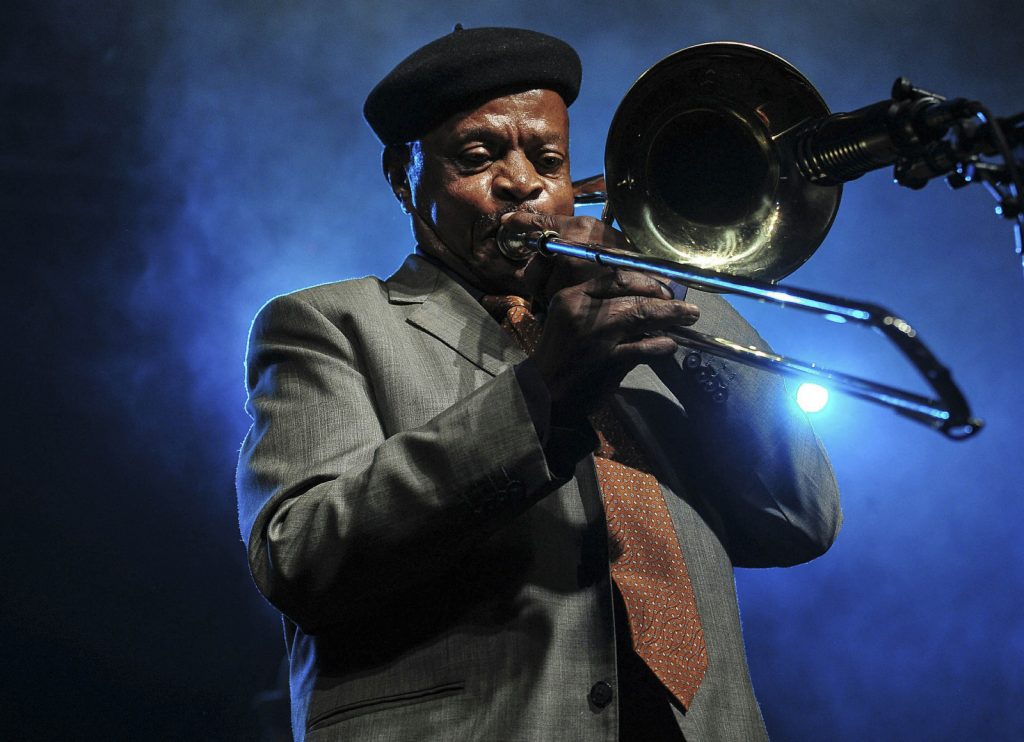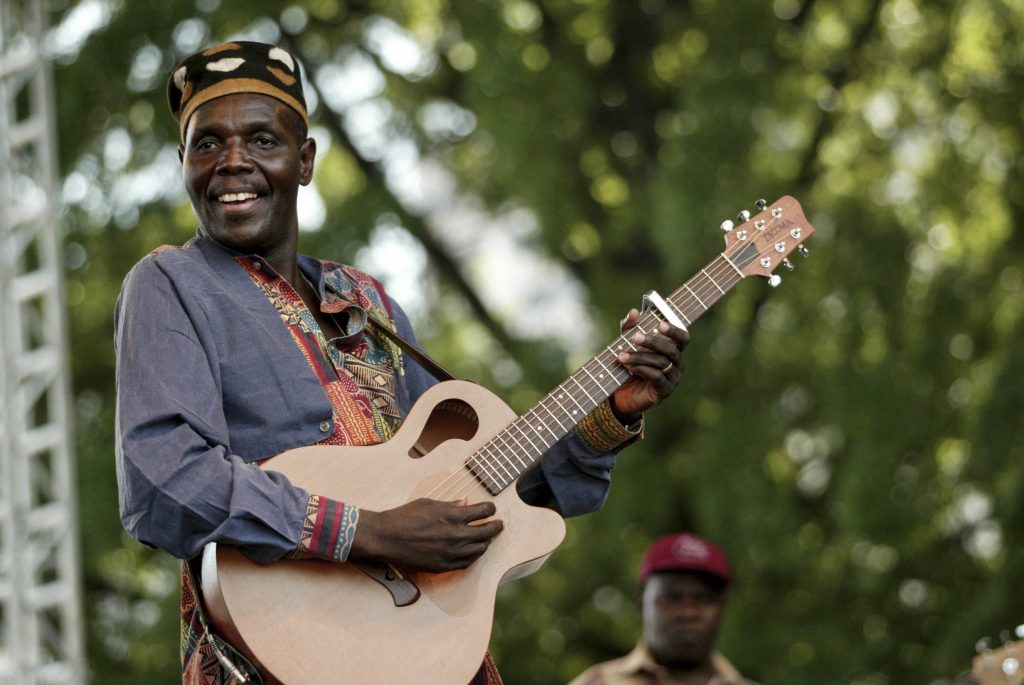African trumpet player, singer and songwriter Hugh Masekela performs at North Sea Jazz festival, The Hague, Netherlands, 10th July 1994. (Photo by Paul Bergen/Redferns)
Over the past few years, the month of January has been scarred by deaths of outstanding figures from the African arts and culture landscape; people without whose investment and cultural capital South Africa would’ve had to fight sustained battles to help unshackle itself from the chains of oppression, remnants of which are made manifest in our daily interactions on public and private domains.
It’s difficult to envision futures devoid of these national monuments. Beginning with bra Hugh Masekela in 2018, the baton of death has passed on from year to year taking artists such as bras Willie Kgositsile, Jonas Gwangwa, Oliver Mtukudzi, as well as mam’ Sibongile Khumalo.
There’s no denying that mam’ Sibongile was all manner of amazing. A towering figure in the music industry, she wore multiple hats throughout her career spanning 30-plus years — administrator, educator, activist, singer and songwriter. She composed universes and stood on the side while her other gifts propelled them to whatever corners they needed to occupy.
 ‘First lady of song’: Sibongile Khumalo’s voice, knowledge, professionalism and kindness reached many singers and millions of listeners. Photo: Fanie Mahuntsi
‘First lady of song’: Sibongile Khumalo’s voice, knowledge, professionalism and kindness reached many singers and millions of listeners. Photo: Fanie Mahuntsi
Her death in January 2021 of a stroke after a long illness shattered all who knew her, from the inner circle of family and friends who had long been aware of her condition to the wider music world of collaborators and admirers.
In his tribute, bra Herbie Tsoaeli, who played on her Live @ The Market album, as well in the all-star sextet Uhadi Ensemble, reflected on her professionalism in music; how the peaks and valleys she reached kept musicians who had accompanied her during performances in gear. “She moved with spirits,” he wrote.
Whether flexing her vocal range as part of orchestras, magnetising the audience as a theatre performer or communing with the ancestors in her jazz offerings, she was one of a kind.
Sis’ Brenda Sisane, a close friend, recalled her larger-than-life personality. “If there [was] something that needed a community leader, she would step in and take that position without fear or favour, just because she thought we needed to be in there.
“I was inducted into that place of women because of Sibongile, who then extended my relationship with her into meeting and hanging out with Dorothy Masuka, with Abigail [Khubeka].”
Sisane speaks of someone who extended what knowledge and kindness she had experienced while coming up to those in league with her, and younger ones as well. “[That’s why] she could be so bold as an established artist. I find that from her case study, it looks like that’s how you’ve got to be as a woman.”
The kindness stretched to younger artists too, the likes of Thandi Ntuli and Nomfundo Xaluva. As Xaluva wrote in her loving tribute: “Her career was the embodiment of artistic dexterity, a tree with many branches equal in strength and solidity.”
Bra Hugh Masekela writes about her in his biography, Still Grazing.
“There must have been close to twenty thousand people at the Moretele Park Festival on that Sunday. Sibongile Khumalo, who was my broadcasting partner on a Sunday radio show and one of South Africa’s top jazz and opera divas, was also performing.
“After our radio show that morning, our last one together, I told Sibongile that I would be leaving for substance abuse recovery in England. She was so happy for me that she jumped up and down for joy, shrieking with joy and relief. It started raining like hell just as Sibongile finished her performance. The twenty thousand people who had waited for me didn’t care.”
There are a few artists on the continent who have had as illustrious and outstanding a career as Masekela had. The homie from Alexandra grew up in a home of disciplinarians who upheld the importance of education and instilled a learning-oriented mindset that would carry him and his siblings through many sticky situations. His mother Pauline was a social worker, and his father was a health inspector and sculptor.
But it was his early introduction to life as a touring musician that enabled how he navigated the music industry, including during the many years he spent in exile. He was a serial collaborator who either recorded or produced groundbreaking projects with the likes of The Jazz Epistles, The Union of South Africa (alongside Jonas Gwangwa and Caiphus Semenya) and Hedzoleh Soundz, to whom he was referred by his friend Fela Kuti while spending time in West Africa.
He also maintained long-standing relationships with people, and nurtured an environment where the young musicians he would find proceeded with breakneck speed to become luminaries.
Moses Molelekwa — who would be turning 50 this April — was invited to join bra Hugh’s first South African group on his return from exile in 1992, was one of them. Earlier, Tshepo Tshola found refuge in Masekela after breaking away from Sankomota, a group he had helped establish.
In one of his last public engagements before he fell ill, bra Hugh was joined by rapper Riky Rick in a conversation series held in the lead-up to the Joy of Jazz festival. An emcee who had for a long time bubbled in the rap underground while plotting and planning the moves that would make him an artist conversing with a statesman whose rockstar status had endeared him to the likes of Miles Davis, what could be better? It was a memorable night.
Bra Hugh wore his usual, casual charm as he regaled both Riky Rick and the audience with stories of his audacious come-up. They spoke about music and about fashion, two things both took pride in.
“Not only did they dress, they set the standard for dressing in the world. By the 1930s, 40s, everybody wanted to be an African-American, all over the world. I always say that if it wasn’t for Louis Amstrong [and] all those people, we’d probably still be wearing white-powdered wigs and those buckled shoes that George Washington used to wear,” said bra Hugh, referring to how jazz musicians changed things for the better.
A few months after that link-up, on the morning of 22 January 2018, the father of African jazz departed from Earth. To say he left many hearts shattered is an understatement. Two other musicians were to meet the same fate in the years that followed.
‘If you seek to name one musician whose life embodies the South African people’s struggle for a national culture, it must be trombonist, composer and cultural activist Jonas Mosa Gwangwa,” wrote sis’ Gwen Ansell after his death in 2021.
 Rich legacy: Trombonist, composer and cultural activist Jonas Gwangwa embodied the people’s struggle. Photo: Veli Nhlapo/Sowetan/Gallo Images
Rich legacy: Trombonist, composer and cultural activist Jonas Gwangwa embodied the people’s struggle. Photo: Veli Nhlapo/Sowetan/Gallo ImagesA cultural figure steeply dipped in the resistance movement against apartheid, he left behind a legacy of “political education as heard through music” unlike any of his era, and did with the trombone what uMkhonto we Sizwe generals were doing in the camps.
He fought the enemy with a singular focus; he channelled victory, but was aware that this couldn’t be achieved alone. Before founding the Amandla Cultural Ensemble and touring the world in the 1980s, ntate Gwangwa was kicking it with Hughie and Caiphus [Semenya] in the United States as part of the trio The Union of South Africa, which had to disband after Gwangwa sustained a leg injury that rendered touring impossible.
Recalling those years, bra Hugh writes in his book that he received a call from ntate Caiphus Semenya. “Jonas had come to Los Angeles and was staying with him. The three of us formed a group called The Union of South Africa.”
Intense daily rehearsal followed, the sessions of which resulted in their self-titled epic of an album. The rest of the band featured the likes of frequent Masekela collaborator Joe Sample as well as Wayne Henderson, and other members of the Jazz Crusaders — Wilton Felder and Arthur Adams.
“[The album] was completed over two weeks, mainly because we had rehearsed so intensely for at least three weeks. The results were a masterpiece.”
Bra Steve Dyer encountered ntate Gwangwa during the 1980s. I called him to speak about his memories of him, and with mukuru Oliver Mtukudzi, whose successful album Tuku Music he produced, along with five other projects.
“I helped him form this group called Shakawe in Botswana, and that was the music division of Medu (Arts Collective). He would spend half his time on tour with Amandla Cultural Ensemble outside, going to all the different places in the world, and then he would spend half the time with us.
“Some of the stuff that he later recorded, we used to play in Botswana — Ledimo lea Tsoga, Diphororo, Ulibambe Lingashoni. [The music] had a message. Bra Hugh came in a couple of years later, and they were the two prevailing bands there. Bra Hugh was political in his own way, but maybe not as specifically as bra Jonas,” he said.
The story of how he ended up in Botswana is an interesting one. According to Dyer, he flew in from the US on tour. He didn’t feel like going back, so he took the return ticket money and drank it at the President Hotel and then stayed on. He was always a guy that loved the community of home, and he really missed that when he was outside.
His enduring work with the ensemble is one part, and has influenced musicians such as Mandla Mlangeni and his Amandla Freedom Ensemble to do the work they’ve been doing over the past few years.
On the other hand is his oeuvre as a solo artist. The repertoire was far-reaching; everything from the American blues to African wedding songs formed part of one big melting pot. Besides the classics referred to by Dyer, Kgomo, Maseru, Morwa and many others are testaments to his compositional might.
Of producing the music of Tuku, bra Steve had the following to say: “I had to do a lot less with him and his band at that stage. A lot of the songs were largely arranged, even his backing vocalists at that time were great as well. It was just enhancing what was already there for me.
“His microphone technique in the studio was impeccable, and also his work ethic. He didn’t smoke and he didn’t drink. [It doesn’t matter] that he had done 40 albums, if we had a rehearsal that needed to be done, he would be the first one at the rehearsal. He was driven and consistent, and he had great songs and a great voice and a great message. What more do you need from an artist?”
 Top selling African artist Oliver Mtukudzi & Black Spirits performs during the Music Midtown 2002 in Atlanta, Georgia. 5/5/02 Photo by Scott Gries/Getty Images
Top selling African artist Oliver Mtukudzi & Black Spirits performs during the Music Midtown 2002 in Atlanta, Georgia. 5/5/02 Photo by Scott Gries/Getty ImagesOne of the last times that Tuku, who died on 23 January in 2019, graced us eMzansi was during Arts Alive’s Jazz on the Lake Festival in 2018.
He couldn’t make it before the day, and it was left to Dyer to rehearse the band.
“He’d never met [them] before we went on stage. He had a later gig somewhere else out of town, but I knew that it was going to be alright. We had communicated before; we agreed on the set list. He just got on stage, we knew the arrangements, and that’s how it happened. I’ve never done that before, but it worked out on the day.
“I never knew that it was going to be the last time on stage with him. What can you say?” said bra Steve.
“He looked strong at that time. You never know about these things; when it’s going to happen. I didn’t see him much after that, until I got the news that he was no more.”
Such has been the presence of death in our lives, especially during the worst times of the Covid-19 pandemic, that it’s hard to think about the future with a clear head.
But the new guard is here, continuing the work and imparting that wisdom of elders to the ones coming after them. The paths our forebears torched shall shine brighter from one generation to the next.